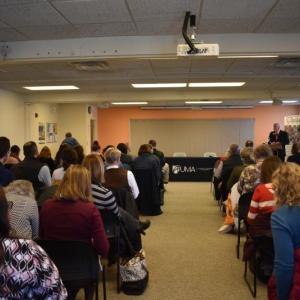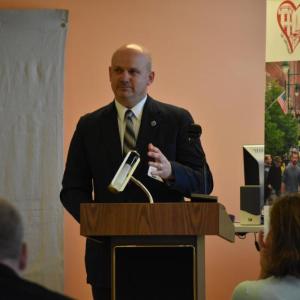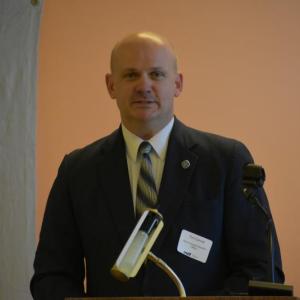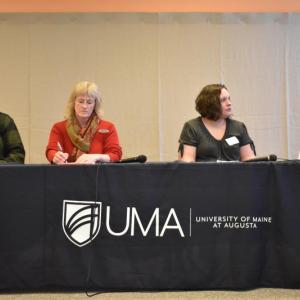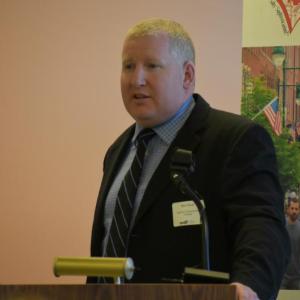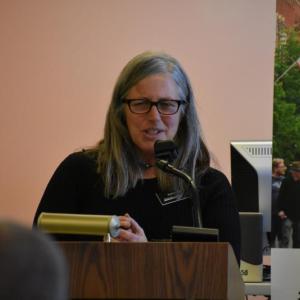Maine improves, strengthens prisoners’ re-entry process to work and community
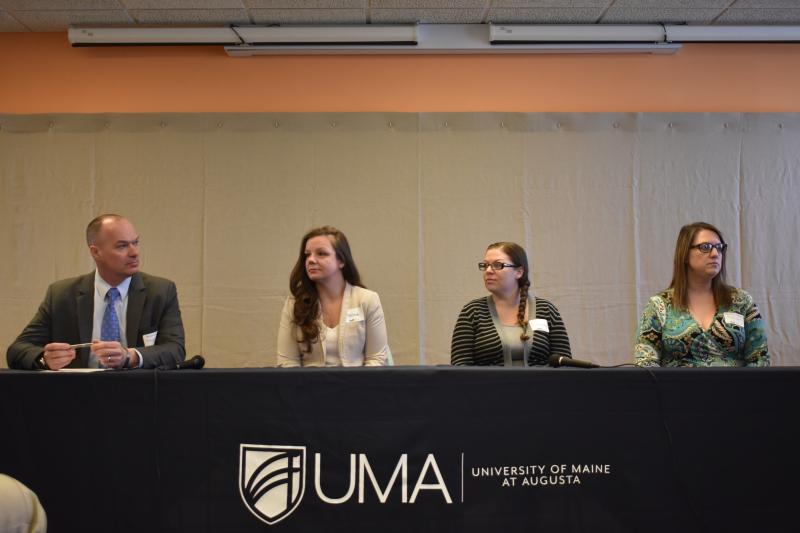 Maine’s Department of Corrections Commissioner Randall Liberty Randall Liberty shares information during one of three panel discussions at a forum about hiring work-release inmates. (Photo by Sarah Thompson)(Photo by Sarah Thompson)
Maine’s Department of Corrections Commissioner Randall Liberty Randall Liberty shares information during one of three panel discussions at a forum about hiring work-release inmates. (Photo by Sarah Thompson)(Photo by Sarah Thompson)
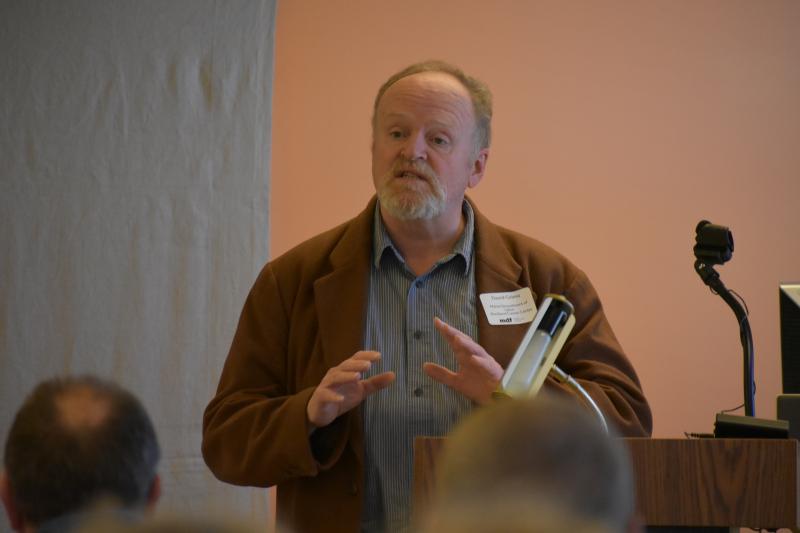 David Grima tells prospective employers at a URock forum of a tax incentive for those who participate in the Prison’s pre-release program. (Photo by Sarah Thompson)
David Grima tells prospective employers at a URock forum of a tax incentive for those who participate in the Prison’s pre-release program. (Photo by Sarah Thompson)
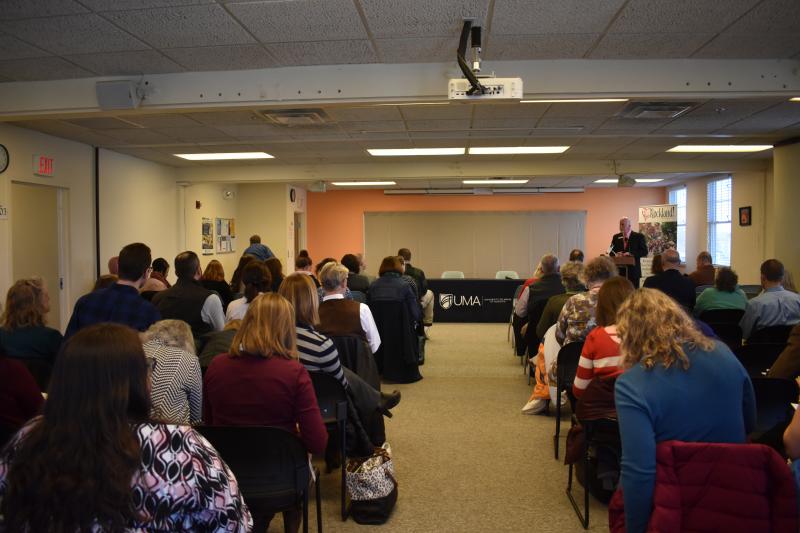 (Photo by Sarah Thompson)
(Photo by Sarah Thompson)
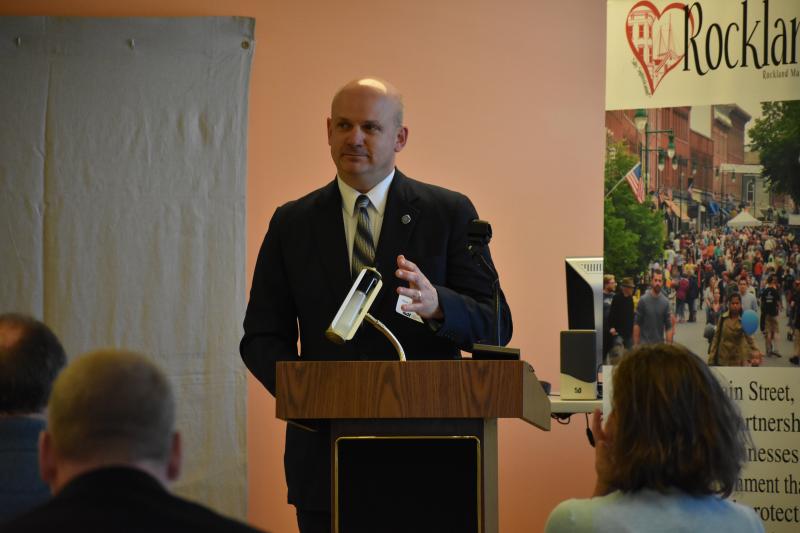 Knox County Sheriff Tim Carroll heads a county jail where inmates typically stay less than nine months. (Photo by Sarah Thompson)
Knox County Sheriff Tim Carroll heads a county jail where inmates typically stay less than nine months. (Photo by Sarah Thompson)
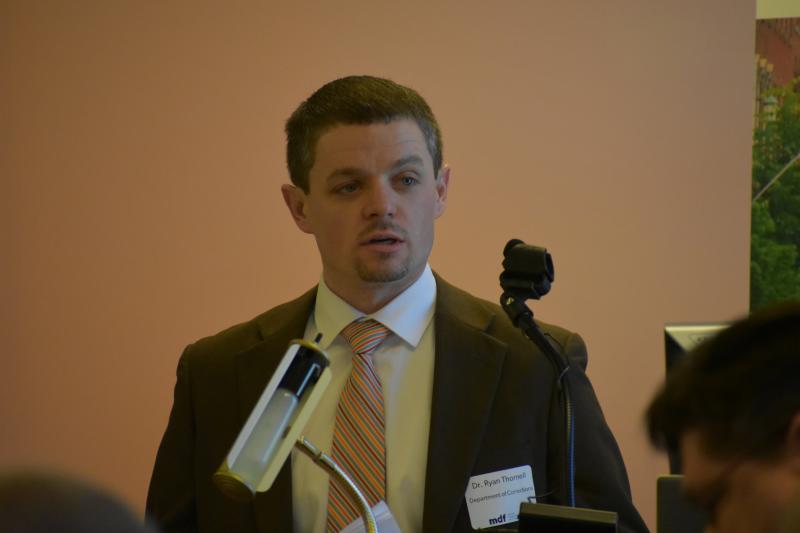 Deputy Commissioner Ryan Thornell provides an overview of the Maine State Prison system. (Photo by Sarah Thompson)
Deputy Commissioner Ryan Thornell provides an overview of the Maine State Prison system. (Photo by Sarah Thompson)
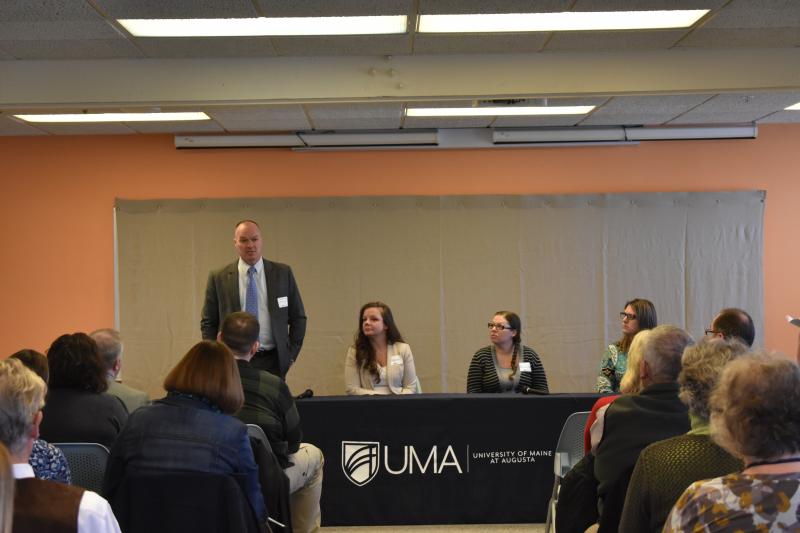 (Photo by Sarah Thompson)
(Photo by Sarah Thompson)
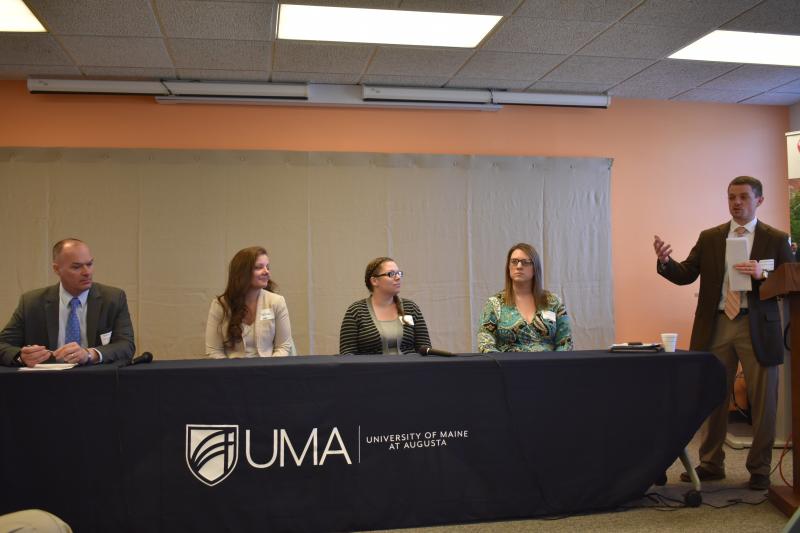 (Photo by Sarah Thompson)
(Photo by Sarah Thompson)
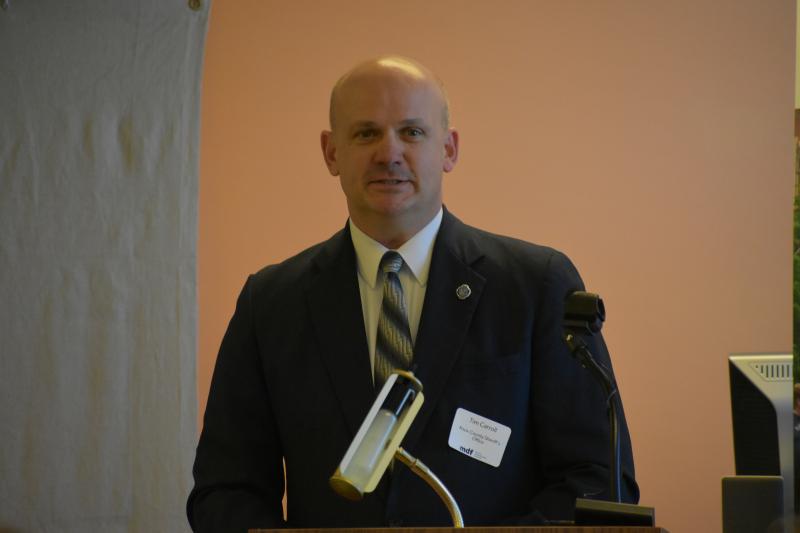
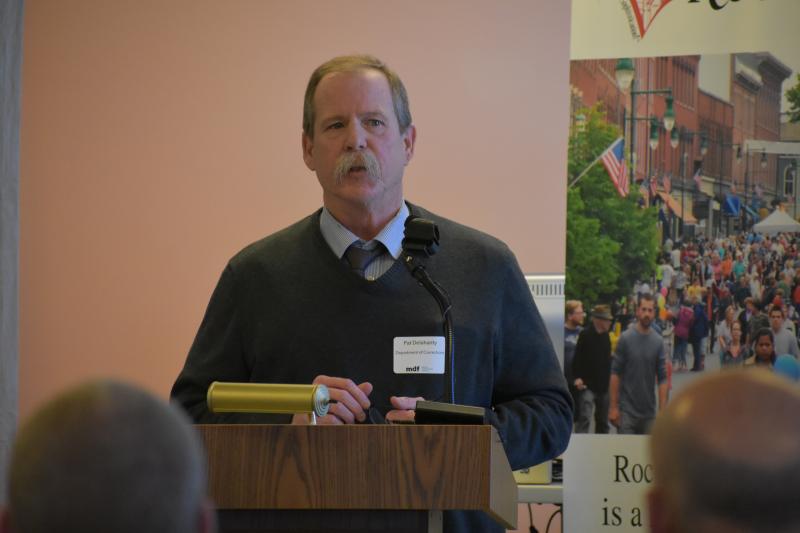 Probation Administrator Pat Delahanty speaks of the Prison’s change of perception of what a successful release involves. (Photo by Sarah Thompson)
Probation Administrator Pat Delahanty speaks of the Prison’s change of perception of what a successful release involves. (Photo by Sarah Thompson)
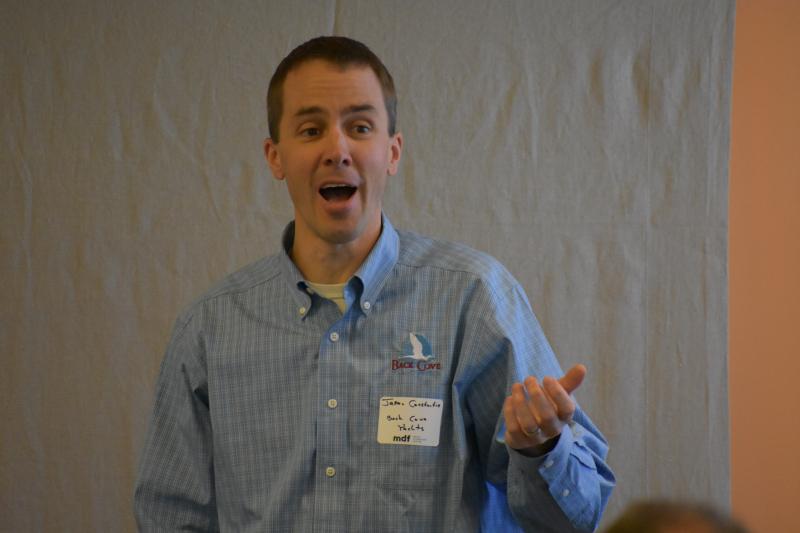 Jason Constantine, of Back Cove Yachts, voices support for the pre-release program. (Photo by Sarah Thompson)
Jason Constantine, of Back Cove Yachts, voices support for the pre-release program. (Photo by Sarah Thompson)
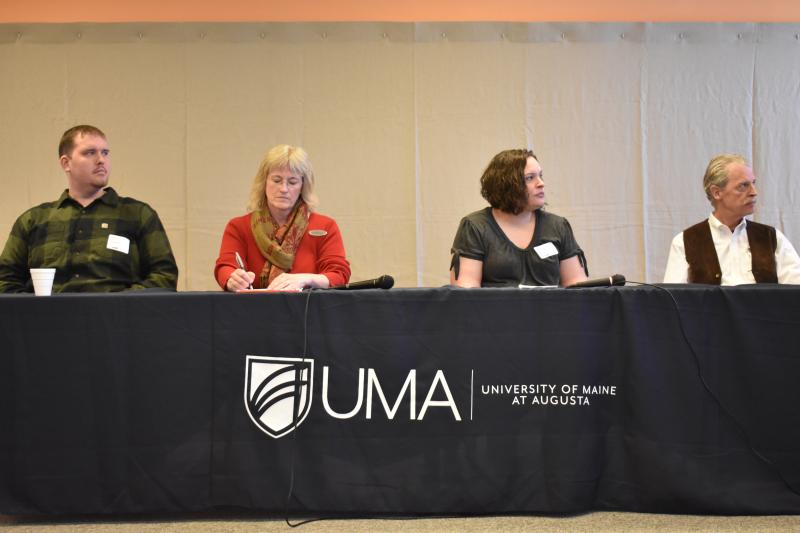 Samoset Inn and Spa (in red) and Lie-Nielsen Tool (in white) share positive experiences with employing inmates. (Photo by Sarah Thompson)
Samoset Inn and Spa (in red) and Lie-Nielsen Tool (in white) share positive experiences with employing inmates. (Photo by Sarah Thompson)
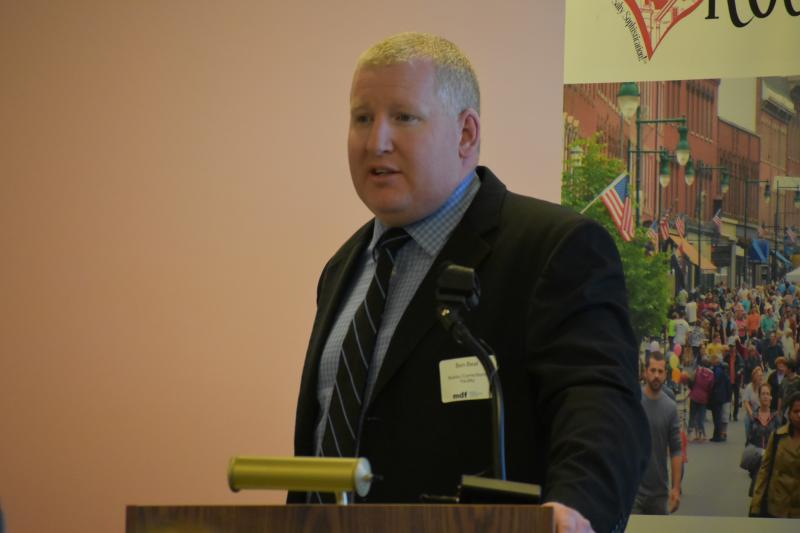 Ben Beal, director of Bolduc Correctional Facility, moderates the third panel discussion. (Photo by Sarah Thompson)
Ben Beal, director of Bolduc Correctional Facility, moderates the third panel discussion. (Photo by Sarah Thompson)
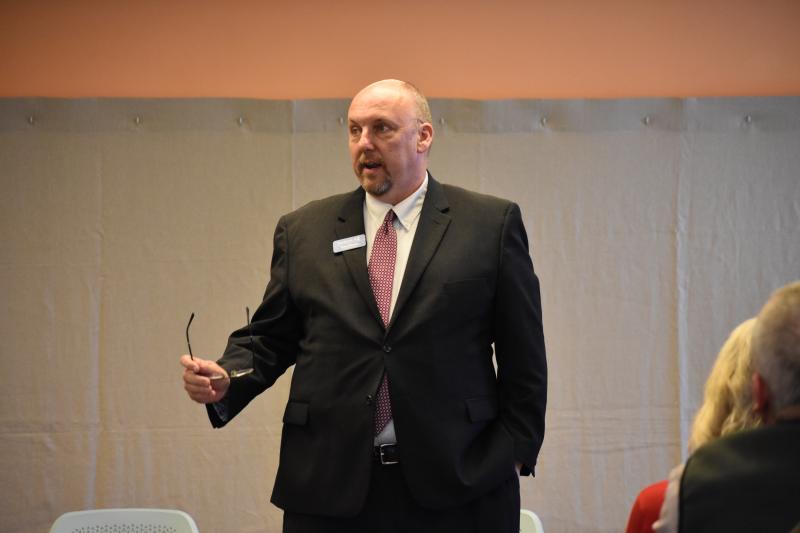 Tom Peaco, of Penobscot Bay Chamber of Commerce, offers assistance to employers. (Photo by Sarah Thompson)
Tom Peaco, of Penobscot Bay Chamber of Commerce, offers assistance to employers. (Photo by Sarah Thompson)
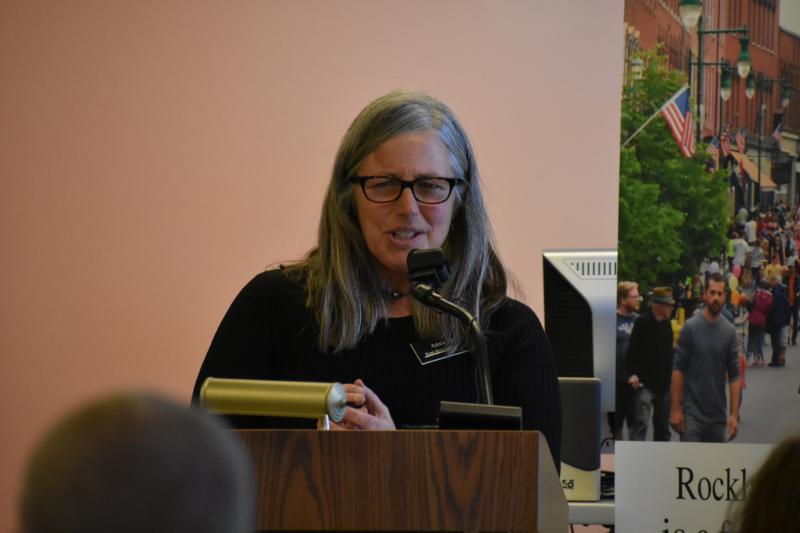 Ann Beal, of Maine Downtown Institute, helped arrange the forum. (Photo by Sarah Thompson)
Ann Beal, of Maine Downtown Institute, helped arrange the forum. (Photo by Sarah Thompson)
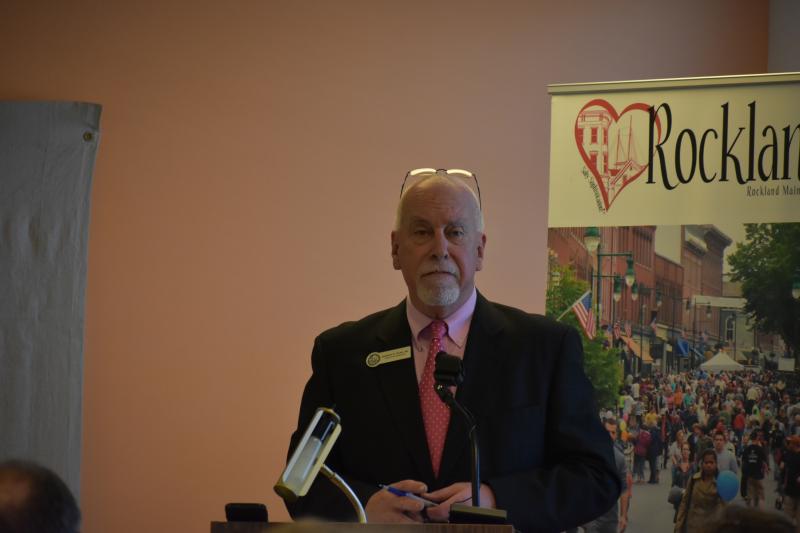 Gordon Page, director of Rockland Main Street, Inc., emcee’d the three-hour event. (Photo by Sarah Thompson)
Gordon Page, director of Rockland Main Street, Inc., emcee’d the three-hour event. (Photo by Sarah Thompson)
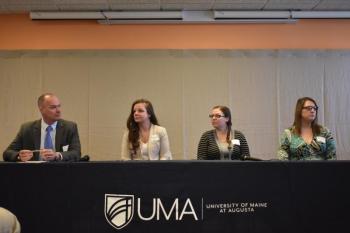 Maine’s Department of Corrections Commissioner Randall Liberty Randall Liberty shares information during one of three panel discussions at a forum about hiring work-release inmates. (Photo by Sarah Thompson)(Photo by Sarah Thompson)
Maine’s Department of Corrections Commissioner Randall Liberty Randall Liberty shares information during one of three panel discussions at a forum about hiring work-release inmates. (Photo by Sarah Thompson)(Photo by Sarah Thompson)
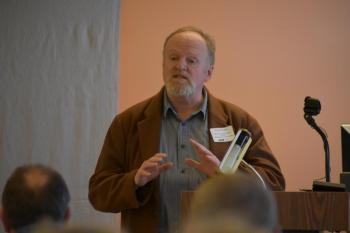 David Grima tells prospective employers at a URock forum of a tax incentive for those who participate in the Prison’s pre-release program. (Photo by Sarah Thompson)
David Grima tells prospective employers at a URock forum of a tax incentive for those who participate in the Prison’s pre-release program. (Photo by Sarah Thompson)
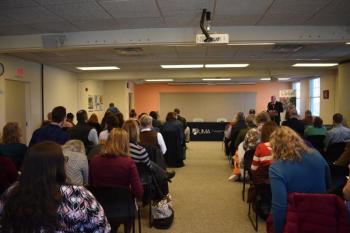 (Photo by Sarah Thompson)
(Photo by Sarah Thompson)
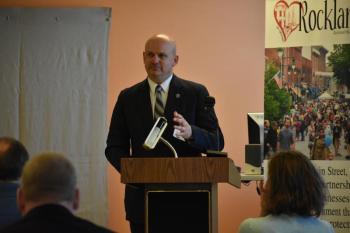 Knox County Sheriff Tim Carroll heads a county jail where inmates typically stay less than nine months. (Photo by Sarah Thompson)
Knox County Sheriff Tim Carroll heads a county jail where inmates typically stay less than nine months. (Photo by Sarah Thompson)
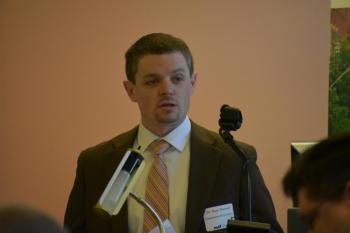 Deputy Commissioner Ryan Thornell provides an overview of the Maine State Prison system. (Photo by Sarah Thompson)
Deputy Commissioner Ryan Thornell provides an overview of the Maine State Prison system. (Photo by Sarah Thompson)
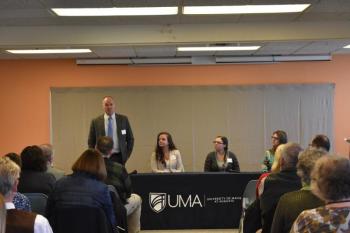 (Photo by Sarah Thompson)
(Photo by Sarah Thompson)
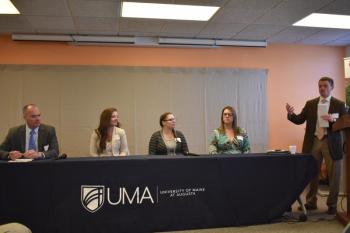 (Photo by Sarah Thompson)
(Photo by Sarah Thompson)
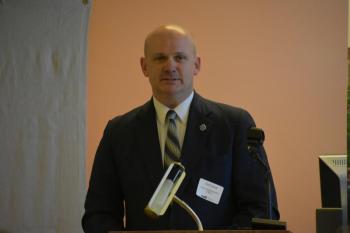
 Probation Administrator Pat Delahanty speaks of the Prison’s change of perception of what a successful release involves. (Photo by Sarah Thompson)
Probation Administrator Pat Delahanty speaks of the Prison’s change of perception of what a successful release involves. (Photo by Sarah Thompson)
 Jason Constantine, of Back Cove Yachts, voices support for the pre-release program. (Photo by Sarah Thompson)
Jason Constantine, of Back Cove Yachts, voices support for the pre-release program. (Photo by Sarah Thompson)
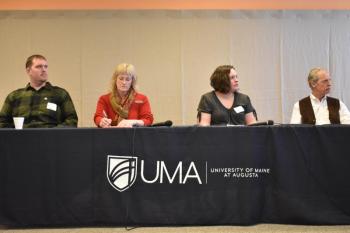 Samoset Inn and Spa (in red) and Lie-Nielsen Tool (in white) share positive experiences with employing inmates. (Photo by Sarah Thompson)
Samoset Inn and Spa (in red) and Lie-Nielsen Tool (in white) share positive experiences with employing inmates. (Photo by Sarah Thompson)
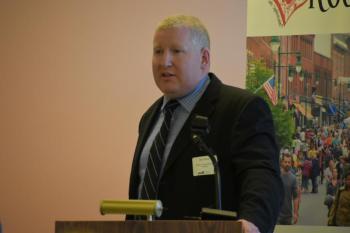 Ben Beal, director of Bolduc Correctional Facility, moderates the third panel discussion. (Photo by Sarah Thompson)
Ben Beal, director of Bolduc Correctional Facility, moderates the third panel discussion. (Photo by Sarah Thompson)
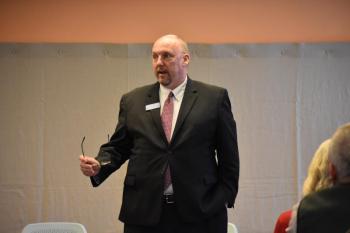 Tom Peaco, of Penobscot Bay Chamber of Commerce, offers assistance to employers. (Photo by Sarah Thompson)
Tom Peaco, of Penobscot Bay Chamber of Commerce, offers assistance to employers. (Photo by Sarah Thompson)
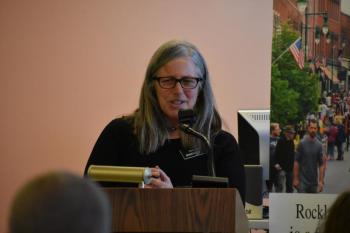 Ann Beal, of Maine Downtown Institute, helped arrange the forum. (Photo by Sarah Thompson)
Ann Beal, of Maine Downtown Institute, helped arrange the forum. (Photo by Sarah Thompson)
 Gordon Page, director of Rockland Main Street, Inc., emcee’d the three-hour event. (Photo by Sarah Thompson)
Gordon Page, director of Rockland Main Street, Inc., emcee’d the three-hour event. (Photo by Sarah Thompson)
ROCKLAND — Local employers need laborers, prison releasees need work experience, and corrections facilities need a way to reduce recidivism. Maine’s program to meet these three goals has gained traction over the last decade and on March 20, Maine Department of Corrections personnel, prisoners and ex-prisoners held a public forum to help local employers to understand better the process of hiring prison inmates and return them successfully to the labor force.
In a room at the University of Maine at Augusta’s Rockland Center, on the third floor of the Breakwater Building, approximately 60 attendees gathered for the three-hour discussion that was segmented into three sessions.
At least five of the audience members were employers interested in hiring through the work-release program, and seeking more information. Others included local employers who’ve been involved with the program for years, as well members of the Department of Labor and its Rockland Career Center, and a few inmates who told of how the program has benefitted them.
The event was organized by Maine Downtown Institute.
Local employers not familiar with the program expressed hesitations about hiring offenders.
A stigma engulfs the word ‘felon’ on a job applications.
And 72 Maine probation officers currently keep tabs on 6,728 prior offenders.
Ten years ago, when Pat Delahanty began as a probation officer, his goal was simply to “keep talking baseball” with the former offenders he oversaw. As time went on, he recognized that his (and his co-workers’) get-through-the-year mentality wasn’t helping those on probation. They were surviving, but they weren’t improving.
What is working, nowadays, is the community effort to connect under-staffed small businesses and volunteer groups with an under-used labor pool hoping to prove themselves.
Success stories from inmates in various stages of re-entering the local economy, schooling, and work-release, along with enthusiastic program support from involved employers, encapsulated the program’s strength.
Delahanty began his corrections career in an environment of “catch and release.” No one ever asked the offenders “why?” What is your background? Or, what took you to prison?
No one ever determined where the inmates’ skill sets lay. No one told them what they were good at.
Instead, the prison pushed them through their sentences, authorized the releases, and labeled them “failed” with the first infraction of probation rules.
“It was truly unfortunate,” said Delahanty.
Unfortunate not only for the 1,200 to 1,300 incarcerated prisoners who make their way through the Maine Correctional Center in Windham, on an annual basis. The complications extend to families, as well.
Yet, as communities have learned, a “village” can alleviate some of the families’ burdens associated with having someone in prison.
Right now, there are approximately 2,400 inmates — 2,150 men and 250 women — at five adult facilities throughout Maine. Bolduc Corrections Center, in Warren, is a minimum custody, pre-release facility for men. Women prisoners are at the Southern Maine Women’s Redemption Center, another pre-release facility, in Windham.
Their average length of stay is 17 to 18 months. During the final four months, those who qualify can participate in the work-release program. The first month is in-prison training. The next three, they can join the businesses at the job sites.
But who will hire them?
“This is your opportunity as community stakeholders to influence multi-generational impact,” said Maine’s Department of Corrections Commissioner Randall Liberty. “In Kennebec County, I would often get calls from a grandmother, whose daughter was incarcerated. She (the grandmother) had the three kids, and struggled with that.
“One of the primary factors of ensuring success in the community is if they have a job. That’s something you can make a difference with.”
And, as an incentive to employers who participate in the release program, their businesses can apply for a tax credit.
Familiar logistics are hurdles to success
“Housing is a huge problem,” said Pat Delahanty, probation administrator . “No question about it.”
James has housing in the Midcoast because someone associated with the program was willing to take him in. Other inmates still within the confines of Bolduc are provided transportation.
However, at least for Back Cove, retention after release is a problem. Workers who don’t have connections to this area have increased difficulty. adding, again, to the labor shortage.
Transportation, or lack of, is another hindrance.
One of James’ goals had been to re-instate his drivers license after a nine-year suspension. That is now accomplished, yet prior, he had to find transportation from his Rockport employment to his Rockland probation officer.
Open to all ideas
The corrections facilities open their doors for tours to stakeholders. They invite potential employers in and show them how the process works inside the education area where 8 to 10 classes are going on at any given time, according to Liberty.
Referencing the state prison in Warren, where he was formerly the warden, Liberty described implementing a sustainable agriculture program there. To do so, the prison partnered with the University of Maine Cooperative Extension, which teaches the Master Gardener program. On eight Thursdays, for three hours each, Mark Hutchinson went to the prison and taught from one of the classrooms.
“There’s a lot happening in a therapeutic, growing atmosphere, where people are excited about learning, programming, and moving forward with their lives,” said Liberty.
Other programs focus on the hospitality industry, or construction, or raising future service dogs for veterans.
One hundred and forty inmates are working in the woodshop on projects for the Prison Showroom on Main Street in Thomaston.
“If you want to bring something in and partner with us, in preparation of them being released to your facility, to your business, it’s very easy to do,” he said. We do it all of the time.”
Employers can provide an information session on what the business is about, or a school or individual can share a skill.
“People have come to us with some out-of-the-box ideas, with a realistic job market attached to it, and we have navigated some of those rough waters to make it happen,” said Ryan Thornell, deputy commissioner of the Department of Corrections.
As an example, the women’s center of the prison brought in a computer coding program. That required access to the internet and websites, “and all of this technology – things that Corrections typically steered away from,” he said.
“We navigated all of those hoops. It was a lot of bumps and bruises along the way. But we had, I think, six women that participated in that. They put in long hours at the computer learning that coding.”
That program has since shifted to the Re-entry Center because it better fits the Correction’s dynamics.
Another example is the mock interview. Inmate Samantha participated in a mock interview program where employers come in and offer assistance to prisoners on what to say and how to behave in interviews. Several months after release, the company she mock-interviewed with called her and offered her the job for real.
Many calls from Midcoast employers
Last summer, David Grima received many calls to the Rockland CareerCenter, where he is an employment and training specialist.
“They’d say ‘please, can you send me some workers?’ as if they envisioned (that) we’ve got rooms full of people hanging on coat racks, waiting for jobs.”
One such call came from a desperate Midcoast construction company owner.
“People were offering her money – for her company to build them houses,” said Grima. “And she was turning them down due to a labor shortage.”
After she conceded that she didn’t know how to engage with offenders, Grima was able to ease her concerns regarding the work-release program.
As a result, she acquired a work crew and was able to complete her summer season construction projects.
What the owner may have found is what the Samoset Resort and Spa, Back Cove Yachts, Rockport Granite, Lie-Nielsen Tool, Fisher Engineering, MDOT, and Rockland Main Street already know.
Once on the job, work release participants are the same as non-inmates. They wear similar attire, receive the same wage (with direct deposit to their individual prison accounts). They keep the same hours, follow the same rules...
With some exceptions: Probation officers will stop by the work sites, or the worker will leave for appointments with the officer. Cell phones and internet are prohibited, and corrections facilities may have additional rules.
Otherwise, a worker is a worker.
Jason Constantine, chief operating officer of Back Cove Yachts, said: “Yes, we call ourselves boatbuilders, and we are in the boat-building industry...but, the reality is, when we walk in the door each day, we are in the people business. We focus more on the individual and less on the boats.”
As does every other business in the state, according to Constantine, his company struggles to find people, and is limited by the number of people it can hire.
“We have a million people in the entire state,” he said. “We have the oldest state, per capita, in the entire country. We’ve got more retired folk than Florida does. So, our workforce is automatically half of what we’d like it to be. You get into the Midcoast, and then further north, it’s even worse.”
The company recognizes that everybody applying to them has life problems, regardless of whether they came from a corrections facility.
“Everybody coming to work is looking for that opportunity (to work and be successful),” he said. “And guess what? They are all bringing something with them, challenges that they’ve got to deal with in their life. Whether it’s coming with probation and rules....or somebody who has a sick kid and had to stay home.”
Back Cove also recognizes is that people want to be a part of something where they can grow, develop, learn, and that is bigger than themselves.
“At the end of the day, folks on a job want someone whose going to work hard beside them,” said Constantine. “They don’t care what you are doing outside of work. It’s ‘you know what, we’re here to do the job, and collectively build this boat.’”
Moving on with success
Laura was an inmate at the Women’s Correctional Facility in Windham. She told the audience in Rockland that until she completed programs during incarceration, she had no self confidence, and believed that her only way to live life was to continue in the way that got her incarcerated.
Through the programs, she realized she wanted something different for herself.
After release, she has worked her way up from entry-level at a Southern Maine Dunkin’ Donuts to shift leader, and is on her way to running her own store as a manager.
“I can’t mess up,” she said. “Two stores rely on me every single day to make the orders, to make sure I have enough people on my crew to fill the shift.”
James is more local. He’s from 4.5 hours north of Rockport, but landed in the Midcoast to get away from the negative influences of his former situation.
While at the Maine State Prison, he completed a nine-month drug program.
“I’ve got goals,” he said. “My employer now, helped me change my life....He helped with the things that I needed while I was in Bolduc.
“I’m on the right track.”
Reach Sarah Thompson at news@penbaypilot.com
Event Date
Address
United States



